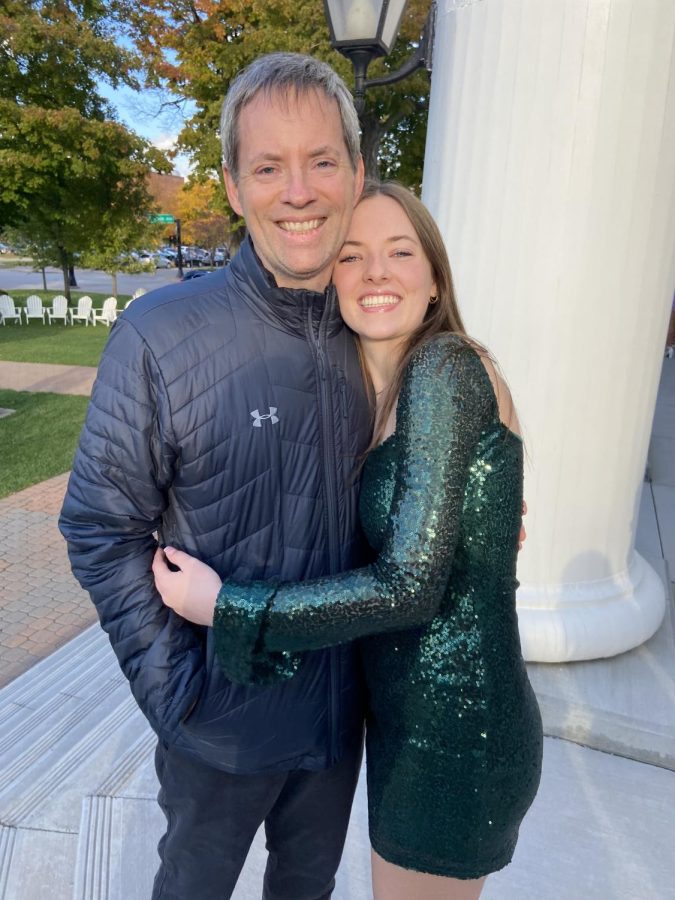Thank goodness for the bad news
Keith Starkenburg (father) and Mia Starkenburg (daughter) sharing an embrace.
May 5, 2023
The phone rings: “Come into the emergency room right away.”
For as long as he could remember Keith Starkenburg, my dad, had a scary heart rate of 40-45 beats per minute (BPM). A typical adult heart rate is 60-100 BPM. From being a football player in middle school, a debater in high school, a stressed out college/graduate student, and eventually a dad to three kids, his heart rate stayed the same. It became his party trick–a game to see just how low his rate could go. For him, this was normal.
Although, in the past decade he had begun to experience symptoms that were abnormal. My dad, middle aged, very healthy, always had issues with fatigue. He found himself tired and unenergetic at the end of an easy day of work. Chronic pain and strange injuries were consuming his life. Taking 30 minute walks prompted him to lay down for a nap. But the concerning symptoms never raised an issue with his doctor. Simply because he was healthy on paper.
The Dental Hygienist
After moving to Michigan in 2022, my dad had to see a new dentist. At his first appointment, the dental hygienist was immediately alarmed by his heart rate. My dad protested, claiming he was “completely healthy,” but the hygienist had other instincts. She insisted he see a doctor.
A few months later, my dad decided to see about his heart. The doctor’s office gave him a heart monitor, and shortly after attaching the device, they placed a call. “Come into the emergency room right away; there’s something wrong with your heart.” Immediate panic ran through his body, as for 30 years he assumed his heart was as healthy as they come. My mom and dad rushed to inform me and my sister. For us, this was a hard pill to swallow.
My dad, the most health-conscious man I knew, was going to die.
That’s what ran through my mind.
As it turned out, my dad wasn’t going to die. He was diagnosed with a complete AV heart block ( 3rd degree). The top half of his heart didn’t communicate with the bottom half, resulting in back-up electrical systems in the heart pumping his blood.
“If you are getting any heart surgery, this is the one you want,” said cardiologist Sanjay Dandamudi, my father’s heart specialist. Third degree heart block, as it turns out, is an easy fix. The condition is repaired with a pacemaker, a device that ‘rewires’ the electrical system in the heart. In fact, the procedure is so simple that it’s an out-patient surgery. Meaning, my dad would be heading home from the hospital the same day as his surgery.
Kidney Disease
Prior to any surgery, there are various tests and labs that need to be completed to allow the all-clear before heading into an operating room. For my dad’s specific heart condition, he was sent to the hospital for an MRI of his entire body.
The MRI was supposed to be predictable. But when it came to my dad, we all began to expect the unexpected.
On the Sunday before his pacemaker surgery, my dad was informed the doctors found cysts on his kidneys. To most people this would feel like a blindside, but for my dad, it was typical. My grandfather had kidney disease: The genetic kind. It works like this: if one parent has kidney disease, their child has a 50% chance of being born with it. At this point, my aunt and uncle had already been diagnosed, but we had never considered it for my dad. He’d never shown usual symptoms that came to surface for the rest of his family.
After talking to his doctor in more depth, he found out the disease wasn’t well advanced. Thank God. His health regimen had come through once again. His diet and exercise was exactly what is needed to maintain a healthy kidney.
We are grateful
Post-diagnosis, my dad is thriving.
Living in mystery is exhausting. For my dad, it was taking a toll on his mental health. People around him began to mock his pain, claiming it was ‘all in his head.’ From the outside, it would surely seem that way.
But for those who lived with him every day, for my family, we knew the effect the unknown was having on his emotional stability. After seeing his behavior and energy levels post-pacemaker, that was all the more true.
My dad wakes up ready to start the day, and takes long walks after finishing a day of work.




